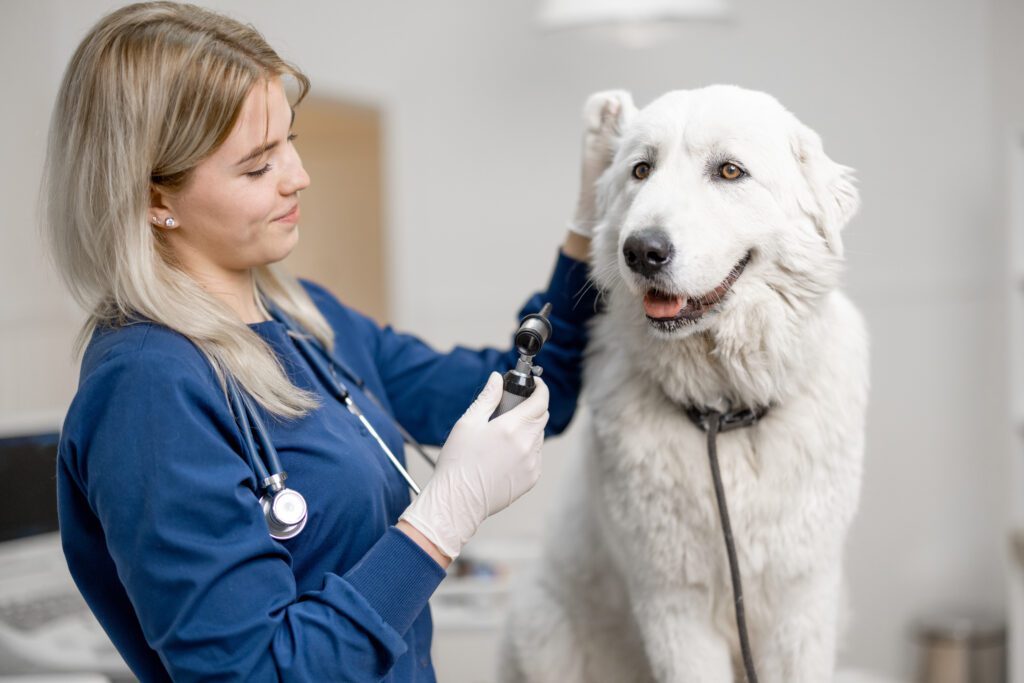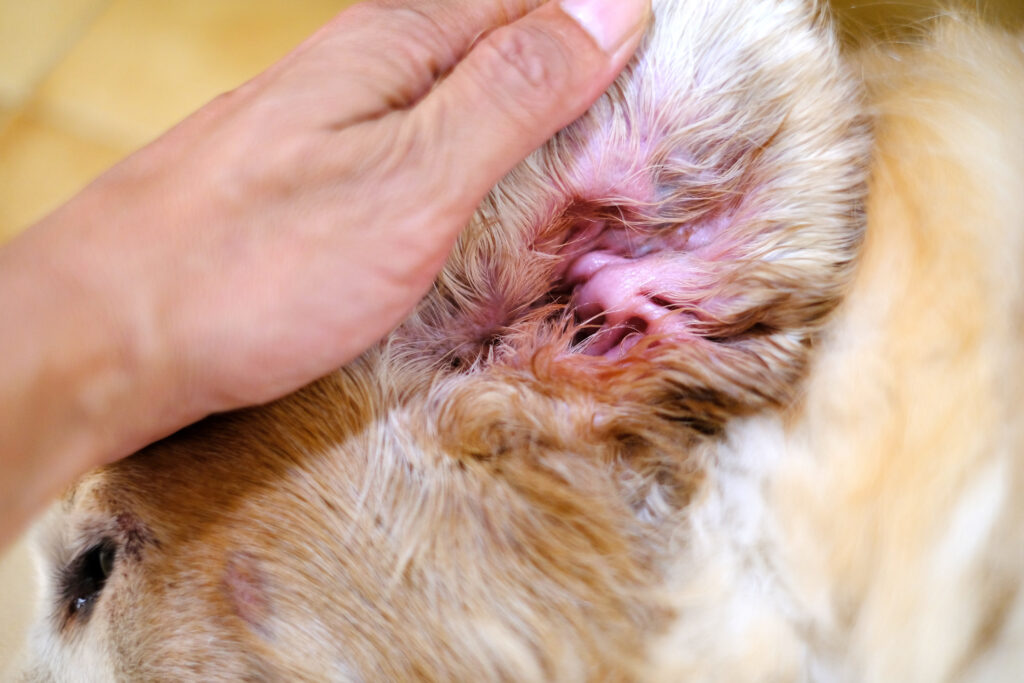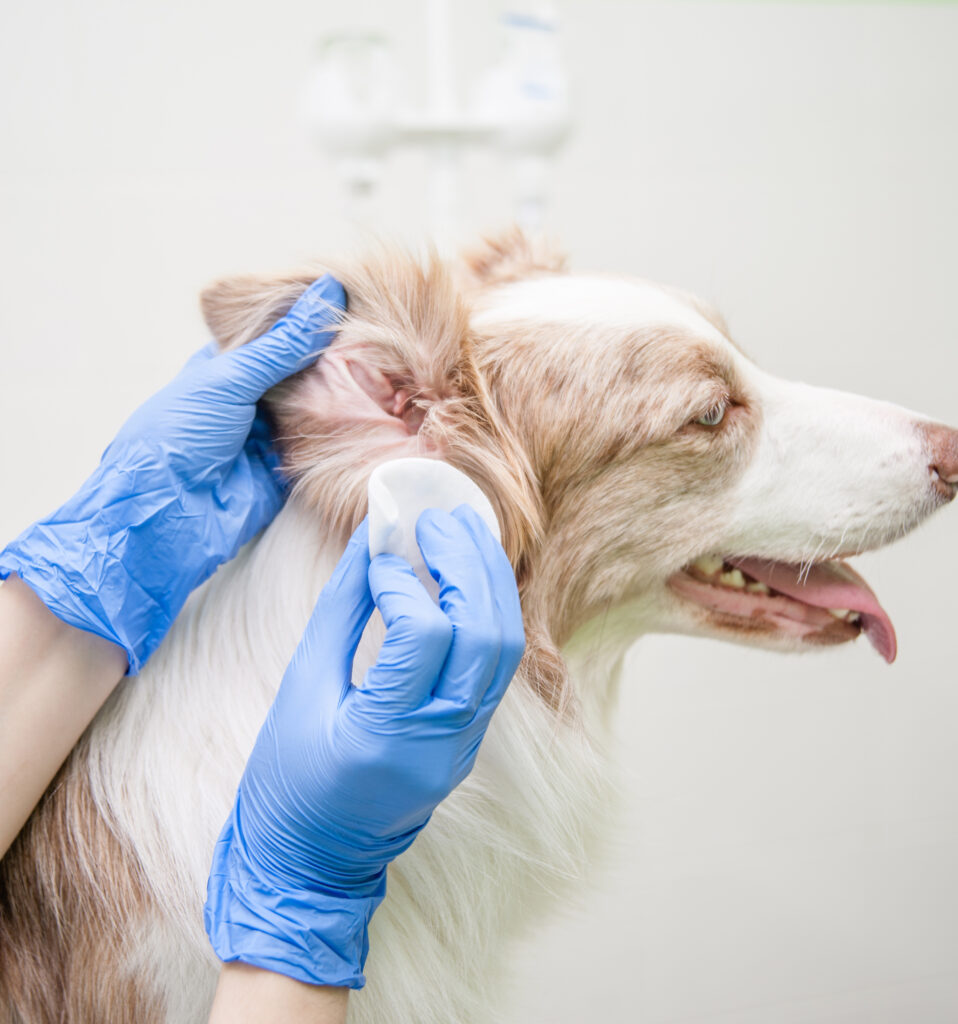
Written by Rachel Holly
Vet-reviewed by Kevin Smith, DVM, Richmond Road Vet Clinic
Causes, Symptoms, & Treatment of a Common Problem
Is you dog constantly scratching his or her ears? Are they shaking their head? If so, chances are good that an ear infection is the culprit.
Ear infections in dogs are a common and often distressing issue for both pets and their owners. While ear infections usually don’t present a significant threat, delaying treatment can allow the infection to worsen and cause increased pain. Certain types of infections can cause more serious complications so promptly addressing your dog’s ear health is important.
What Causes Ear Infections in Dogs?
Ear infections in dogs can be caused by a variety of factors. The most frequent causes of ear infections are:
Bacteria – These occur when there is an overgrowth of bacteria in the ear canal. Bacterial infections may be secondary to another problem, like allergies, a growth, or foreign object in the ear.
Yeast Infections– Yeast infections are typically caused by malassezia fungi and occur often in dogs with allergies and those in a highly humid environment. You can often tell the presence of a yeast infection in your dog’s ear by the bad odor it emits.
Ear Mites – These tiny parasites cause intense itching and inflammation. Ear mites are highly contagious and spread easily from one dog to another. They can also be gotten if the dog has been in wooded areas with bushy overgrowth.
Foreign Objects– Debris, such as dirt or grass from their paws, can get lodged in the ear canal.
Allergies – Allergies are a very common cause for infections, especially dual ear infections.These can be allergies to food, environmental factors, or contact allergens.
Symptoms of Ear Infections

Recognizing the symptoms of ear infections early can help in prompt treatment and relief for your dog. Common signs include:
head shaking
excessive scratching or rubbing
whining, especially when scratching the ear
rubbing head along furniture or hard surfaces
redness or swelling of the ear
pain
bad odor
discharge
What Dogs Are At Risk For Ear Infections?
Any dog can get an ear infection but some are more likely due to their ear structure.
Dogs that have floppy ears are more inclined to suffer ear infections because the opening of the ear is covered and moisture builds up and can’t escape. Dogs with upright ears get good air flow.
If you dog experiences allergies, they are more likely to develop ear infections as one of several symptoms that result from seasonal allergies.
Dogs that live where the summers are humid ( yes, that’s Middle TN) are more susceptible to ear infections.
Are Ear Infections Dangerous?
Usually, no. The most common type of ear infection is otis externa, inflammation of the external part of the ear canal. However, dogs can develop inflammation of the middle or inner ear. In these cases, it is possible for more serious problems to occur such as lack of balance, facial paralysis, and deafness. This is why you should never dismiss your dog’s ear infections.
Treatment of Ear Infections
Treatment of ear infections depends on the underlying cause. If the ear infection is secondary to another problem, then that issue must be addressed first or you’re likely in for repeating infections. Your veterinarian can easily diagnosis your pet’s ear infection and prescribe an appropriate treatment plan. Common treatment options may include:
Topical Medication -This includes anti-fungal or anti-inflammatory ear drops that address bacterial or yeast infections and reduce inflammation. These can be be given at home but if that is problematic ask your vet about Claro Ear Drops which is a single application and can be done in office.
Oral Medication – your vet may prescribe an oral antibiotic or anti-inflammatory drug.
Ear Cleaning: Proper ear cleaning is necessary to remove debris and allows for better application of drops. Your vet can demonstrate the correct technique for you to follow at home.
Parasite Treatment– In the case of ear mites, your vet will prescribe appropriate treatments to eliminate the parasites and soothe the affected ears.
Ear infections usually respond quickly to treatment. Most minor cases will resolve in a week or two but a more serious infection could require a longer period. Ear infections can often reoccur. It’s important to give your dog their drops or medication exactly as prescribed by their vet.
Preventing Ear Infections

There’s no sure way to prevent your dog from getting an ear infections but you can reduce his risks. You lessen the chance of your dog suffering an infection by maintaining good ear hygiene and addressing underlying health issues. Ways to do that include:
Regular Check-ups– Routine veterinary visits can help catch early signs of infections or underlying conditions that can lead to infections.
Ear Cleaning– Regular cleaning, as advised by your vet, can help prevent the build-up of wax and debris. See what products your vet recommends for your dog.
Allergy Management – controlling allergies decreases the risk of infections. Your vet may recommend a diet change or a medication regime to keep your dog’s allergies in check.
Reduce Moisture Build-Up – Keep water out of your dog’s ears at bath time. Gently wipe ears dry after swimming.
While ear infections in dogs can be uncomfortable and potentially serious, understanding their causes, recognizing the symptoms, and seeking prompt veterinary care can ensure effective treatment and relief for your canine friend. By following preventive measures like good ear hygiene and maintaining regular check-ups you can help keep your dog’s ears infection-free.